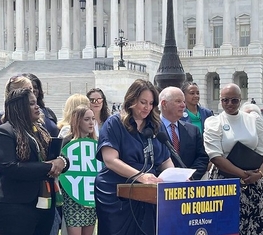How We Talk About Voters: Public Messaging Guidance
When we talk about voters, it’s important to our mission that we use empowering language. These tips can help enhance the way we speak about voters in our public messaging.
LWV’s mission is to empower voters and defend democracy. So when we talk about voters in our public messaging, it’s important to our mission that we use empowering language.
At the League, we want to describe accurately the barriers that voters face and call out the bad actors who create them. It's important that, in doing so, we never forget the people at the center of these issues and always work to define them not by their challenges but by their aspirations. This is how we empower voters in all our League efforts.
Check out the table below for examples of how to re-frame some of the most commonly used phrases for talking about voters.
| Replace | Embrace | Why |
|---|---|---|
|
Voting is easy Voting is important |
Voting is your right |
Voting is not easy for everyone, and to make that our message is to deny the targeted voter suppression that people of color, with disabilities, or with a language barrier continue to face. Similarly, simply stating that voting is important is not as empowering as saying that voting is a right that inherently belongs to every voter. |
|
Do your civic duty / responsibility |
Make your voice heard |
A duty or a responsibility is a task to complete, and this language can sound patronizing. In contrast, every voter has a voice in our democracy — an asset rather than an assignment. |
|
People don’t vote because... People don’t think [local elections / redistricting / the census] is important because... |
People care about their community and deserve to have a say in the decisions that affect them |
The truth is, we don’t know why people don’t take an action, and we shouldn’t judge them by it. What we can be sure of is that people value their communities, and voting is how they can take action. |
|
Turnout is low among young voters |
Young voters are energized and ready to make their voices heard |
Young voters are underrepresented due to a number of factors, including that they are targeted by voter suppression efforts. Frame young voters in terms of their values and aspirations, not in how they have failed to meet some standard. |
|
People don’t know about [XYZ issue, voting rule, etc.] Voters are confused |
Voters deserve clear and accurate information about [XYZ] |
Voters have different entry points and motivations. To say voters don’t know about a certain issue is not accurate. Frame voters in terms of what they deserve and value rather than what they lack. |
|
Voters [with disabilities / without transportation / who do not speak English / with limited income] are being silenced |
Voters [with disabilities / without transportation / who do not speak English / with limited income] have the right to make their voices heard for themselves and their communities |
Define groups of voters in terms of their aspirations rather than negative effects against them. |
|
Every eligible citizen |
Every [voter / American / Kansan / Wichitan] |
Voters are eligible by definition, and using that word implies that there are people voting who are not eligible. It fuels the disinformation about election integrity. “Citizen” language flags as exclusionary to communities with high immigrant populations. |
|
People think their vote doesn’t matter |
Every voter’s voice matters |
Rather than naming voters’ misconceptions, proactively state their value. |
The basis for this guidance is an exercise called Asset Framing. Asset framing is an equity skill for describing communities by their aspirations and contributions, rather than their challenges or failures.
This collective problem-solving skill engages people from all sides, strengthens every argument for equity, places the value of people at the center, keeps us focused on the positive possibilities, and helps us balance our perceptions.
Consistently thinking about voters and communities with asset framing is a skill that takes practice. At the LWVUS office, we have work to do to sharpen this skill for our public messaging as well.
Related Content
On this page, LWVUS will maintain updated talking points for all Leagues to speak with one voice about voting rights and messaging to counter voter suppression.
Use the following messages to counter attacks on vote-by-mail and pivot the conversation to solutions.
Important dates to message on during 2024 – 2025.




